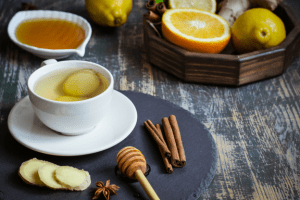
Now is the optimal time to take action on your winter immune prevention program instead of allowing a winter infection to put your life on hold. An effective winter immunity and prevention program offers you support to help protect you from the dreaded ‘winter lurgy’, minimising the impact that illness can have on your life.
The common cold is easily transmitted and responsible for most absences from work and school annually. Our aim in prevention is not merely to strengthen the immune system but to keep the body in a state of balance so that illness does not occur, or so that when it does, the illness is only mild because there is only a small imbalance to correct. This works best when we strengthen the whole person and the whole family alike, while simultaneously strengthening the immune system.
Good Bugs, good gut, good immune system
When it comes to boosting immunity to prevent cold and flu, surprisingly gut health is a key area of focus. The digestive tract is in close contact with the largest part of the immune system in the body – over 70%. It is also home to a plethora of bacteria known as our gut microbiota. Certain ‘good’ bacteria, naturally found living in a balanced relationship in the gut, have supportive benefits – stimulating the activity of the immune system and boosting our immune defences. It is essential to support gut function to help reduce your risk of developing a winter illness.
We can support these good bacteria by eating certain foods that cause them to increase in number. Food is a powerful tool for boosting gut health and can be used safely for children, the elderly and anyone with poor immunity. Here is what to include:
- Eat a ‘rainbow of fruits and vegetables’ – colourful fruits and veggies contain polyphenols that are literally food for good bacteria. Purple are some of the strongest so think blueberries, blackberries, plums, grapes, purple cabbage, carrots, onion and potatoes – farmers markets are a good place to find these.
- Prebiotic foods – specific superfoods that good bacteria feed on include chicory root, dandelion greens, jerusalem artichoke, garlic, onion, leeks, asparagus, barley, oats, apples, flaxseeds and seaweed (raw is better than cooked).
- Probiotic foods – these contain live bacteria that are friends to your good gut bacteria and include coconut yoghurt, kefir, kombucha, tempeh, pickled foods: fermented sauerkraut, kimchi.
Specific strains of probiotics are demonstrated to reduce the frequency, severity and duration of infection such as colds and influenza and can be prescribed by your naturopath where appropriate.
Vitamin D prevents the sneeze
Supporting immunity is one of vitamin D’s numerous roles, specifically in the defence against infections as it improves the antimicrobial properties of immune cells on exposure to microbes.
Research supports the use of vitamin D supplementation to reduce infections. One study showed that, over a three year period, women taking vitamin D were three times less likely to experience cold and flu symptoms compared to those who did not. The study highlighted, that a low dose of D3 drastically reduced the seasonality of reported colds and flu, whilst a moderate dose virtually eradicated all reports of upper respiratory tract infections.¹
Adequate sun exposure is vital for maintaining vitamin D levels. Back this up with dietary sources including eggs and fatty fish, like tuna, mackerel, and salmon. Getting sun can be hard depending on your location and diet isn’t enough alone so vitamin D3 supplementation needs to form part of your winter immune prevention program to reduce the incidence of cold and flu.
Zinc prevents infections
Zinc has immune boosting benefits as it plays an integral role in the maintenance and functioning of the immune system. The most potent food sources include: oysters, red meat, chicken, eggs, nuts, sesame & pumpkin seeds, spinach, mushrooms. Higher doses of zinc in combination with vitamin C in the form of a supplement can be used to support the immune system and help reduce the incidence of infections.
What else? Prevention & treatment starts at home
- Minimise dairy, sugar, white wheat flour, cold drinks and processed juices as these foods can generate excess mucous and support infectious conditions.
- Maximise warming foods with ginger, onion, garlic, chilli, peppers, mustard seeds, sage, thyme, fennel and fenugreek to clear mucous and enhance immunity.
- Keep warm, dry hair after washing and ensure any infections are treated with bed rest.
- Immuni-tea (see recipe below)
Sarah’s immune boosting immuni-tea for two
- 1 tbsp honey
- 2 tsp fresh ginger – grated
- 1 qtr lemon (skin on)
- 1 cinnamon stick
- ½ tsp cinnamon powder
- 6 cloves
- ¼ tsp fresh chopped chilli
- 1 clove garlic
- 500ml water
Add all ingredients to a saucepan and bring to the boil for at least 1 minute.
Strain the tea into your favourite cup and drink warm throughout the day.
By Sarah Harris, FGHG Family and Paediatric Naturopath

References
- Braun L, Cohen M. Herbs and Natural Supplements. 2nd edn. Chatsworth, News South Wales: Churchill Livingstone, 2010; 701-710.




